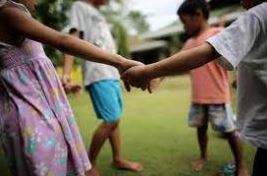
By Neo Semono
Murder, rape and mysterious disappearances are among the horrifying crimes committed against South Africa’s children.
Over the years the nation has heard in horror, and watched in disbelief as news, always too inhumane to comprehend, unfolds about those we ought to be protecting the most.
Citizens have heard in horror of the now lifeless bodies of victims that have been found lying in pieces of veld, among bushes and in ditches and seen in blow-by-blow detail, the violence that was perpetuated on often-lifeless bodies, more times than not found lying in pieces of veld, among bushes and in ditches.
Communities and the police rush around frantically forming search parties for the missing, while agile keyboard warriors also do their bit by spreading the word on missing children and adults alike, on the various social media platforms.
When children go missing, as was the case with six-year-old Joshlin Smith in 2024, law enforcement and communities go looking them. When children are mistreated and abused, the answer is to work together to rescue the child.
Some will blame government for the onslaught of violence against children, but, government cannot solve the issue on its own. The onslaught of violence against children requires at its foremost a community approach, and a change in thinking around children.
Children are no lesser human beings than adults. In fact, our Constitution states that every child (any person under the age of 18) has the right to basic nutrition, shelter, basic health care services and social services as well as to be protected from maltreatment, neglect, abuse or degradation.
The Children’s Act gives effect to certain rights of children as contained in the Constitution while also setting out principles relating to the care and protection of children while the Child Justice Act also exists to ensure that perpetrators are brought to book.
The Basic Education Laws Amendment Act seeks to improve safety at schools. The legislation is in place to protect the lives of the nation’s children. And yes, while some will say that the existence of the legislation does not necessarily mean that they are effectively being implemented; when implemented properly laws do work.
The judgement and sentencing of the trio involved in little Joshlin’s case is a victory in fighting back against the mistreatment of children, albeit the nation still being in the dark about what befell the Western Cape child.
The recent news that a staff member at Laerskool Dalmondeor in Johannesburg was arrested for allegedly sexually assaulting a Grade 2 learner and the case whereby a Durban mother who beat and strangled her three-year-old daughter Fadillah Chantel Kok to death, must lead us to re-evaluate the type of people we are and the society we live in.
The wellbeing of the nation’s children is important to government with Social Development Minister Sisisi Tolashe highlighting the worrying statistics of 26 852 cases of child abuse and neglect having been reported in the 2024/25 financial year.
Sexual abuse was reported to be at 9859 cases across the provinces with deliberate neglect being the second most prevalent at 9485 cases among others.
These incidents and others in the past have many of us questioning in rage, our moral compass no matter one’s colour or religion.
Children ought to be running around barefoot and getting up to mischief across parks and recreational facilities in communities. However, this is not the case for parents and guardians who fear for their safety while playing.
According to the 2024 Mid-year population estimates released by Statistics South Africa, 27.5% of the population is aged younger than 15 years (16.8 million).
The rate of abuse and shocking cases of violence should jolt us into action to do more to protect the nation’s children at all times of the year and not only on days when the country marks Child Protection Week or Child Protection Month in May.
We should revisit the notion that your child is my child more than ever and not turn a blind eye when we see or hear of something untoward.
When we fail to protect children, we fail our country in the long term. If we are to raise generations of forward-thinking, responsible citizens that will take the country forward, it is in our best interest to do the best we can to shape the citizenry of tomorrow.
And because the protection and care of children is a full-time job, government continues to provide the child support, disability and foster care grants as well as the school nutrition programme which provides meals to millions of children.
Government is also paying attention to the boy child through the facilitation of dialogues and engagement to foster an environment of positive masculinity where boys are encouraged to express their feelings. Children living with disabilities have also not been left out as they are among the most vulnerable people.
The enactment of legislation and the provision of funds through grants and government programmes are not the sole solution to protecting South Africa’s children.
The protection of children involves taking proactive steps which include taking the time to truly listen to what children have to say and ensuring that we believe them when they say they have been violated by a family member, teacher, preacher or whoever they may cross paths with.
Additionally, the inherent principle of ubuntu, also stresses that we help those around us. The wealth of a nation is not only measured in rands and cents, but also the priceless assets that are its children. Surely, we can ALL do better to protect them. -SAnews.gov.za


